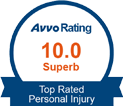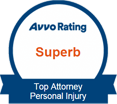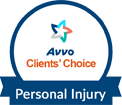A distracted driver has as many odds of causing a car accident as a drunk driver. Alcohol and distraction have similar effects on a driver in that they reduce alertness and slow down response time to emergencies.
When a distracted driver causes an accident, injuries and fatalities are likely to result. Fortunately, you can recover damages from a distracted driver if you suffer any injuries or a loved one dies from the accident.
The Personal Injury Attorney Law Firm helps victims of distracted driver accidents in recovering compensation for their injuries or losses. We work with you in proving that the driver was indeed distracted when the accident occurred. Read on to find out about the most common distractions drivers experience on the road.
Overview
Driving requires full attention and co-ordination of the driver's body to notice road signs, potential hazards, and road conditions and react to these appropriately and safely. However, when distracted, a driver has less control over the vehicle.
A distracted driver is a road hazard. More than 80% of the collisions occur due to distracted driving with the distraction happening seconds before the accident.
States across America have developed laws that prohibit distracted driving. California is among the states with the strictest distracted driving laws, including penalties for driving while distracted.
Driver distraction can be in three forms:
- Mental or cognitive distractions - Distractions that remove the driver’s mental attention from the road. When a driver engages in an action such as texting when driving, they are more likely to pay attention to the text message and not on the road.
- Manual distractions - Distractions where the driver takes his or her hands off the wheel. These distractions occur when the driver is eating, searching for lost items, and holding expressive conversations with friends, or is controlling kids in the vehicle.
- Visual distractions - Distractions that take the driver’s eyes off the road. Visual distractions could include staring at the events outside the car or looking too much into the rearview or side mirrors.
The danger of distracted driving is that it takes a driver’s attention off the road for a few seconds, which is sufficient to do a lot of damage. The NHTSA estimates that in the 5 seconds it takes to read a text message, your car has covered the length of a football field when moving at a speed of 55 miles an hour.
Teenage drivers are more likely to drive when distracted by texting, conversations with friends, or other visual distractions. However, distractions are not limited to teenage drivers only. Even adult drivers often get distracted.
California has implemented several laws that prohibit distracted driving. These include:
- You are not allowed to hold a mobile phone or another electronic device while driving
- You can use the device hands-free, on speaker mode or using command prompts
- Drivers under 18 are not to use a mobile phone when driving
- When using a navigation system, the driver must mount it on the dashboard, without blocking the view of the road and operate it with a single tap or swipe
If a person violates these laws, then he or she will receive a distracted driving ticket. Your attorney can use the distracted driving ticket of another driver to prove the driver's negligence. Acts of distracted driving violate the law and are, therefore, automatically considered negligent.
Even without a ticket, you can prove that a distracted driver was negligent if he or she was using his or her mobile phone at the time of the accident. You can also use the phone records of the driver if he or she was using a phone at the time of the accident.
However, proving a distraction can be harder with other distractions such as grooming or eating while driving.
The common distractions for drivers include:
1. Using Electronic Devices
Electronic devices have permeated all aspects of our lives, too much that we do not notice the dangerous effects they can have. Most people cannot resist the temptation of looking at their text messages or replying to them.
The primary motivation to replying to text messages is the fear of missing out. Another distraction is responding to phone calls. When you are talking on the phone, your mind automatically pays more attention to the conversation on the road.
Depending on the nature of the message, your attention could be fully absorbed into the conversation to a point you could lose manual, cognitive, and visual focus from the road.
2. Grooming
Grooming is another risky behavior. With the constant rush to get everything done, multitasking while driving can be a distraction. Some people engage in grooming activities such as applying makeup, changing clothes, and doing their hair.
Grooming while driving distracts your mental attention, and since your hands are involved, you let go of control of the steering wheel.
3. Reaching for Objects in the Car
Selecting a new playlist, turning the car's air conditioning, and reaching for objects on any part of the vehicle is a common distraction. You must turn your head, attention, or hands from driving to reach for these objects. This increases the risk of causing a collision.
If you have children in the car, fasten them and provide them with items to distract them while you drive. This way, you do not have to turn back to control unruly ones. For older children, discuss with them the dangers of distracted driving and the physical and financial consequences of distracted driving.
4. Eating
Catching up on breakfast or lunch on your way can be dangerous to other road users. If you must eat, pull over at a safe place and enjoy your meal before resuming your drive. Eating involves more than putting food in your mouth. You have to unwrap packages, wipe, clear, chew, and swallow. These activities can easily take your mind and hands from driving.
5. Events Outside the Vehicle
Construction work, a person being arrested, advertisements, and scenic views can distract you from observing the road. By focusing on these activities, you risk causing an accident and injuries to third parties, yourself, and passengers in your vehicle.
Other distractions that can lead to accidents include:
- Reading a book, newspaper or map
- Smoking
- Working while driving
What to Do After a Distracted Driver Accident
If you are the passenger or another person injured in a distracted driver accident, you have the right to recover any damages from the driver or his or her estate. When an accident happens, the first instinct is to panic and confusion.
Most people will rush into taking or assigning blame. However, you can take control of the situation by educating yourself on the steps to consider when you are involved in an accident. The measures apply to people who are still conscious or mobile after the accident. They include:
- Check for injuries on yourself and other people involved in the accident. Help them get medical attention. Call 911 or the police and report the accident.
- Take photographs and where possible videos of the crash and any vehicles involved. Make sure that the images and videos are clear. Check the road for additional evidence, such as skid marks. Take as many photographs as you can – you could print them out later to keep a hard copy of the evidence.
- Talk to the police and report everything that happened. Remember not to admit fault or negligently assign blame to the other driver. You can also request a copy of the report to use as evidence.
- If there are other drivers involved in the accident, exchange contact information with them, refrain from taking the blame. Such words as, “I am so sorry I was on my phone” can be used against you. You must also record any blame the other drivers take for the accident.
- Collect information and contact details from witnesses who saw the crash happening. These witnesses will be useful in proving that the other driver was at fault for the accident. Failing to exchange contact information with the other drivers can work against you in the eyes of the law. Note down the license number, make of the car, and the vehicle identification numbers of all vehicles involved.
- Visit a doctor as soon as possible and document any injuries you sustain. Make sure to inform your doctor that you have an evaluation after a car accident.
- Keep a record of any wages, medical bills, pain and changes you experience after the accident
- Contact a personal injury attorney immediately after the accident. When an accident occurs, most of the evidence is cleared within a few hours or days after the accident. The car wrecks will be towed and other evidence displaced by other cars or weather elements.
- Report the accident to your insurance company whether you are at fault or not. The legal agreement you signed when taking the insurance policy requires that you report any accidents to the provider. However, you are not required to admit fault for the accident. Informing your insurance company gives them time to investigate the accident and prepare themselves for any claims that may arise from the accident. Even if you feel the accident is minor, or no one is injured, keep your end of the bargain by reporting.
Not all accidents involve the victim directly. For example, you are the victim of an accident if your loved one dies immediately or shortly after the crash. In such cases, the approach you take is slightly different from that of a person directly involved in the accident. The same applies if you were seriously injured or unconscious at the time of the accident.
If you are the relatives of a family member who is injured or killed in a distracted driver accident, you need to contact an attorney on their behalf and gather the evidence. You should get to the scene of the accident as soon as possible. Take photographs of any markings on the road or debris left after the accident.
You can also look up the company, which towed the vehicles and take photographs of the damage. Ask around to find any witnesses to the accident. Gather their contact details as well as their testimony. If the victim of the accident can speak, ask him or her to describe the events leading to the accident. Talk to the police and request a copy of the report.
If a loved one dies after a distracted driver accident, the police must establish the cause of death to determine the role of the accident in the death.
When you are involved in an accident, do not engage in activities such as:
- Admitting fault to the other driver, the insurance company or police officers
- Offer to pay for any damages from the accident
- Pay the injured parties directly after an accident (report the incident to your insurance company. Some drivers stage accidents to make money from your auto insurance or unsuspecting drivers)
Compensation after a Distracted Driver Accident
California allows you to recover damages from the negligent party in a car accident. You can recover damages for property or personal injury. The value of the damages will depend on several factors, including:
- The extent of property damage
- The value of the property in question
- The negligence of each party involved in the accident
- The severity of your injuries
- The losses you incur that are directly related to the accident
You have several options after a car accident in California. These include:
- Filing a claim to your insurance company
- Filing a claim with the auto insurance company of the other driver
- Filing a civil lawsuit against the driver
The option you choose will depend on the extent of the injuries and damages incurred. For small claims, you can sue directly against the insurance of the at-fault driver or file a small claims lawsuit.
However, most injuries from accidents are significant and life-changing. They alter your life and that of your loved one in significant ways. For example, if you suffer from mild to severe spinal injury, you may be bedridden for the rest of your life. This means that you will need constant care, medication, and will depend on others to take care of a majority of your needs.
In such a case, you might want to file a lawsuit against the at-fault driver. Such a lawsuit allows you to recover sufficient compensation that is equal to the damages you suffer from the accident.
California personal injury lawsuits employ the pure comparative negligence rule in awarding compensation after an accident. The rule allows you to recover compensation depending on the percentage of fault of the other driver. For example, if you were 10% responsible for the accident, then you can recover 90% of the damages.
The damages allowed in California personal injury lawsuits fall into three categories: economic, non-economic, and punitive damages.
Economic damages are those on which the court can place a monetary value. These include medical bills, lost wages, 4lost future earnings, and property damages. Calculating these damages is usually straightforward. You take the bills incurred or assess the fair market value of the damaged property and sum these up. You might, however, need an expert to help in evaluating the value of future costs associated with the accident.
These future costs include the value of future medical treatment, the medication you will need, and the money you are likely to earn in the future based on your current earning capacity. Some of the factors that play into the value of your economic damages include:
- The costs and losses you have incurred so far (medical bills and lost wages)
- Your current salary
- The severity of your injuries and how they affect your current and future earning potential
- Your life expectancy
- Inflation
Non-economic damages are those whose financial value is hard to determine. They include abstract concepts such as pain, emotional suffering, loss of consortium, and loss of parental care and guidance.
These damages attempt to compensate victims for the physical and emotional pain resulting from the accident. Since these damages do not have a specific monetary value, they tend to be the most substantial in a personal injury lawsuit based on how convincing your case is.
The court awards punitive damages where the at-fault party was grossly negligent. You cannot file a claim for punitive damages. The court has the discretion to determine whether the actions of the defendant warrant punishment.
When to Hire an Attorney
Hiring an attorney after a distracted driver accident is one of the smartest decisions you can. However, if you need some convincing, here are some of the reasons you will need a personal injury attorney:
- The attorney understands the laws and procedures to follow during the lawsuit. The attorney can help you meet important deadlines and follow the right procedures to make the process as hustle-free as possible. In addition, he or she has handled similar cases in the past and can provide an analysis of the possible settlement based on past settlements. This analysis will help you obtain the right compensation for your injuries or the death of a loved one.
- Having an attorney will relieve you of the burden of having to handle the legal matter. You can focus your energy on recovering or readjusting after the loss of your loved one. Your attorney will handle the negotiations, evidence, witnesses, and records required to support your claim. He or she can also organize that information in preparation for negotiations or court proceedings.
- An attorney working on your case increases the chances of a higher settlement hundredfold. Personal injury attorneys handle claim settlement for a living. Therefore, they have mastered the art of negotiating. They are also aware of the tactics insurance companies use to give a low settlement to claimants. With such knowledge and legal expertise, an attorney stands a better chance at settling higher than you could by representing yourself.
- Timing - You waive your right to sue if you agree to settle an accident claim with the insurance company. Without legal knowledge and experience of how most personal injury lawsuits turn out, it is easy to settle within days or weeks after the accident. Such timing could be ideal if only property is damaged during the accident. However, if you suffered injuries, an attorney can help you determine the best time to pursue the lawsuit. Timing is key in ensuring that you receive rightful compensation for the injuries.
- Resources - Personal injury attorneys have the resources and connections that prove important in personal injury lawsuits. They have the materials to gather evidence, document it, and where required, carry out forensic investigations. In addition, they have access to expert witnesses who can prove crucial to the accident. For instance, it would be hard to get an economic expert on your own to testify in your case. It would even be hard to determine that you need that expert in the first place.
Some situations do not need an attorney, especially if the value of your claim is low or only property was damaged in the accident. However, before deciding to hire an attorney or not, you can take advantage of the free consultations offered by most personal injury attorneys. That will give you an idea of the value of your case and help you determine whether you need an attorney.
Find a Car Accident Lawyer Near Me
Distracted driving accidents can change your life in seconds. You could lose a loved one or suffer injuries that will stay with you for life. Distracted drivers often engage in dangerous activities that put them and other road users at risk.
The Personal Injury Attorney Law Firm represents families or individuals whose loved ones are injured or killed in a distracted driver accident. We have experience in collecting the relevant evidence to prove that the at-fault driver was distracted, leading to the accident.
We will handle your case, and you pay when we win. Therefore, you are not risking any loss in order to be compensated for your injuries. Contact us today at 619-625-8707 for a free evaluation.
 800-492-6718
800-492-6718







